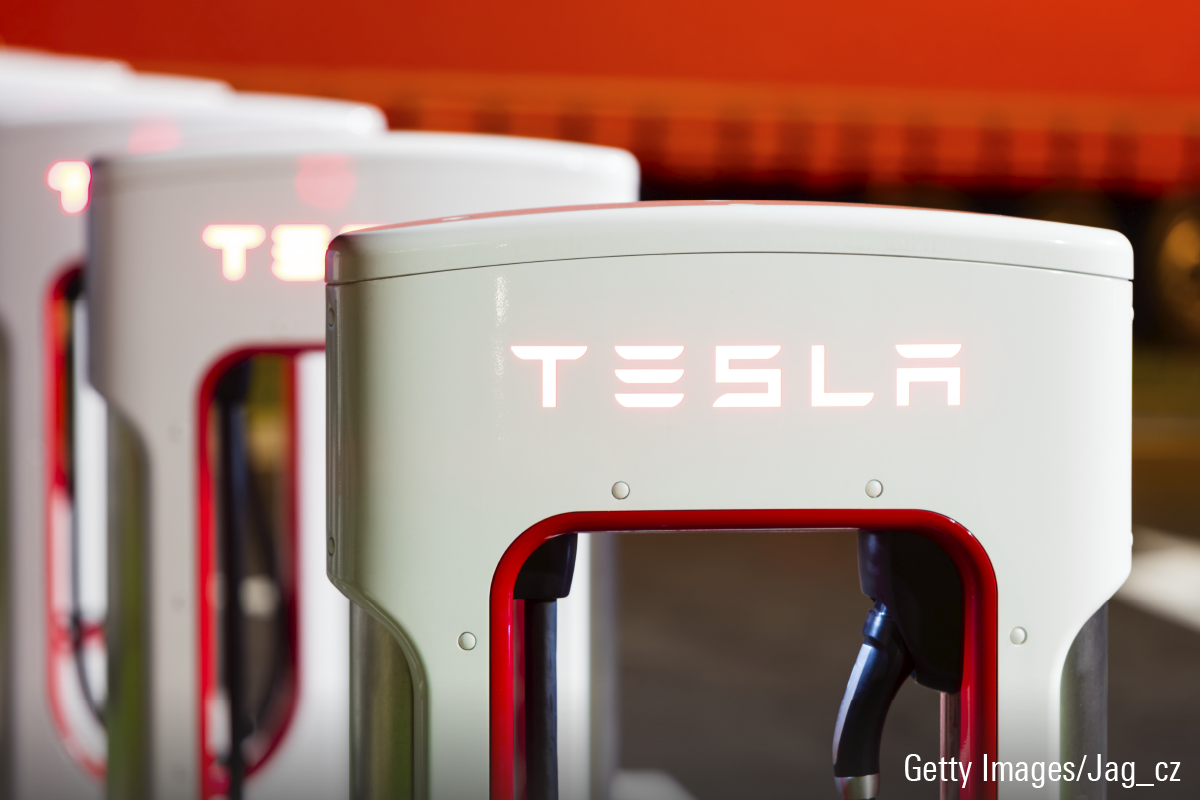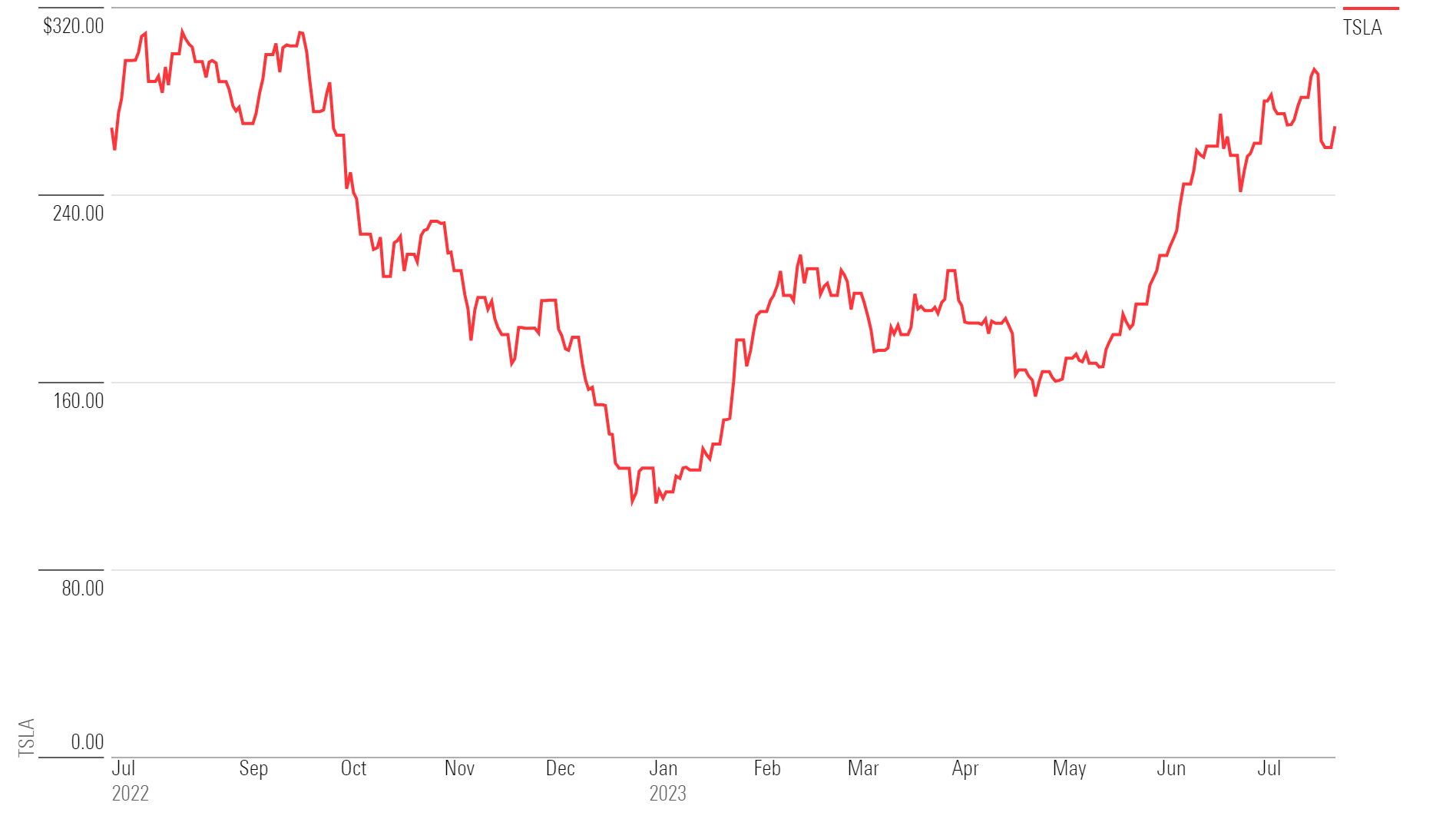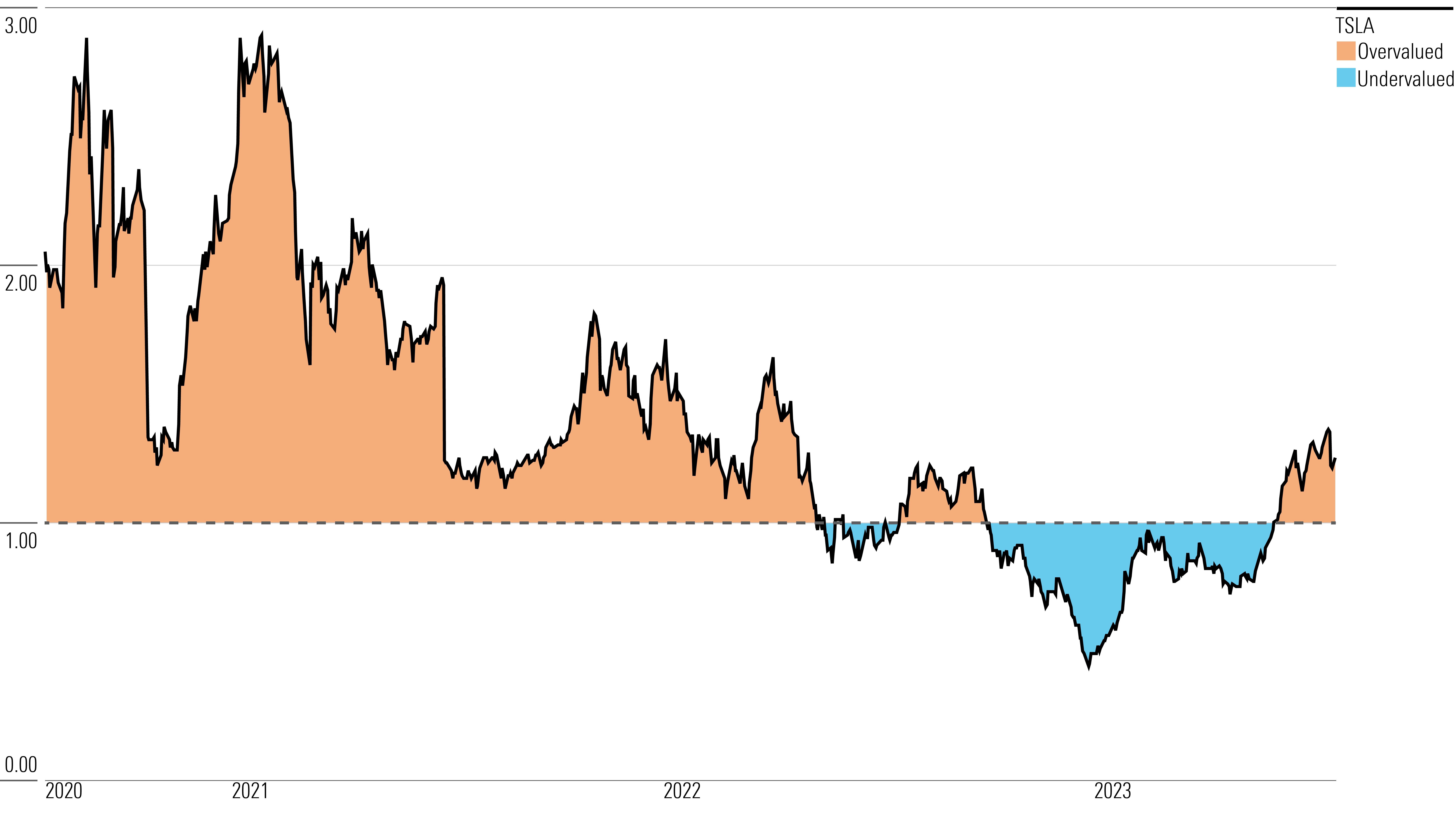After Earnings, Is Tesla Stock a Buy, a Sell, or Fairly Valued?
As the firm cuts prices and sacrifices near-term profit to drive volume growth, here’s what we think of Tesla stock.

Tesla TSLA released its second-quarter earnings report on Wednesday, July 19, 2023. Here’s Morningstar’s take on what to think of Tesla’s earnings and stock.
Key Morningstar Metrics for Tesla
- Fair Value Estimate: $215.00
- Morningstar Rating: 3 stars
- Morningstar Economic Moat Rating: Narrow
- Morningstar Uncertainty Rating: Very High
What We Thought of Tesla’s Q2 Earnings
Cutting prices: There were few surprises in Tesla’s financial results, as revenue and earnings per share were in the consensus range. However, one surprise came in the forward-looking statements, where management reiterated their plan to cut prices to drive volume growth. The selloff that followed likely came due to the market’s revised expectations for profits going forward, as investors may have previously assumed price cuts were largely done.
Sacrificing near-term profits: The results are in line with our view that investors should be wary of Tesla’s stock right now. To drive vehicle deliveries growth, management is sacrificing near-term profits on the premise that Tesla will generate ancillary revenue streams (such as autonomous driving software, charging, and insurance) that will more than make up for it over the long term. While we understand the logic, we think the current stock prices imply a lot of the good news is priced in, which leaves little margin of safety for investors should market sentiment turn negative.
In response to slowing demand, Tesla began cutting prices in the fourth quarter of 2022, and it has continued to do so through the first half of this year, leading to three straight quarters of lower average selling prices and lower automotive gross profit margins. We think the company is likely to cut prices in the second half of the year in response to other automakers also cutting prices, which would result in further margin declines. Accordingly, we reduced our 2023 automotive gross profit assumption. However, we think prices will begin to stabilize by the end of the year as economic conditions improve, leading to 2023 being the cyclical low for margins.
Tesla Stock Price

Fair Value Estimate for Tesla
With its 3-star rating, we believe Tesla’s stock is overvalued compared with our long-term fair value estimate.
Our fair value estimate for Tesla stock is $215 per share. We use a weighted average cost of capital of just under 9%. Our equity valuation adds back nonrecourse and non-dilutive convertible debt.
In the near term, we forecast that Tesla will grow its annual total vehicle delivery volume to around 1.8 million in 2023, or roughly 37% versus 2022. However, due to price cuts far exceeding cost savings, we forecast automotive gross margin contraction in 2023 to 19% from the 29% achieved in 2022.
In the longer term, we assume Tesla will deliver around 5 million vehicles per year in 2030. This includes fleet sales—an expanding opportunity for the company. Our forecast is well below management’s aspiration of selling 20 million vehicles by that time. However, it is nearly 4 times the 1.31 million vehicles delivered in 2022. Our forecast assumes Tesla increases its Model Y deliveries, then successfully launches its light truck, sports car, semi-truck, and eventually affordable sedan and SUV platforms. We think Tesla will be successful in continuing to reduce its manufacturing costs on a per-vehicle basis.
Read more about Tesla’s fair value estimate.
Tesla Historical Price/Fair Value Ratios

Economic Moat Rating
We award Tesla a narrow moat rating, stemming from its intangible assets and cost advantage. The company’s strong brand cachet as a luxury automaker commands premium pricing, while its EV manufacturing expertise allows the company to make its vehicles more cheaply than competitors.
Tesla’s brand cachet is not likely to be impaired any time soon as other automakers move into the battery electric vehicle space, because we expect the company to keep innovating to stay ahead of startup and established competitors.
Tesla has more high-tech vehicles, and the firm can make drivetrain updates and other updates via Wi-Fi or a cellular connection, and customers do not have to visit a store for many service needs. Tesla will instead pick up a vehicle from a home and can often return it the same day while providing a fully loaded loaner for no charge, or technicians can visit a customer’s home or work and service their car there. This experience is much easier than many other automakers’ services, which helps Tesla’s brand equity. And this has been accomplished with little to no spending on advertising, which is rare for a consumer brand.
This strong brand equity has carried over to Tesla’s energy generation and storage business, where the company can charge a premium for the fully integrated solar panel, inverter, and home battery storage systems it sells.
Read more about Tesla’s economic moat rating.
Risk and Uncertainty
We assign Tesla a Very High Morningstar Uncertainty Rating, as we see a wide range of potential outcomes for the company.
The automotive market is highly cyclical and subject to sharp demand declines based on economic conditions. As the EV market leader, Tesla is subject to growing competition from traditional automakers and new entrants. As new lower-priced EVs begin selling, Tesla may be forced to continue to cut prices, reducing the firm’s industry-leading profits. With more EV choices, consumers may view Tesla less favorably. The firm is investing heavily in capacity expansions that carry the risk of delays and cost overruns.
The company is also investing in R&D in an attempt to maintain its technological advantage, with no guarantee these investments will bear fruit. And Tesla’s CEO owns a little over 20% of the company’s stock and uses it as collateral for personal loans, which raises the risk of a large sale to repay debt.
Read more about Tesla’s risk and uncertainty.
TSLA Bulls Say
- Tesla has the potential to disrupt the automotive and power generation industries with its technology for EVs, AVs, batteries, and solar generation systems.
- Tesla will see higher profit margins as it reduces unit production costs over the next several years.
- Through the combination of its industry-leading technology and its unique supercharger network, Tesla’s EVs offer the best function of any on the market, which should help the company maintain its market-leader status as EV adoption increases.
TSLA Bears Say
- Traditional automakers and new entrants are investing heavily in EV development, which will result in Tesla seeing a deceleration in sales growth and having to cut prices due to increased competition, eroding profit margins.
- Tesla’s reliance on batteries made in China for its lower-price Model 3 vehicles will hurt sales, as these autos will not qualify for U.S. subsidies.
- Solar panel and battery prices will decline faster than Tesla can reduce costs, resulting in little to no profits for its energy generation and storage business.
This article was compiled by Monit Khandwala.
Get access to full Morningstar stock analyst reports, along with data and tools to manage your portfolio through Morningstar Investor. Learn more and start a seven-day free trial today.
The author or authors do not own shares in any securities mentioned in this article. Find out about Morningstar’s editorial policies.

/s3.amazonaws.com/arc-authors/morningstar/ca8d2ce1-cd0f-433b-a52b-d163be882398.jpg)
/cloudfront-us-east-1.images.arcpublishing.com/morningstar/ZI3W4F3IORA73KFWC7VAFNOJJ4.jpg)
/cloudfront-us-east-1.images.arcpublishing.com/morningstar/CWMPLAZER5HFBGFDFB45VCOUHI.png)
/cloudfront-us-east-1.images.arcpublishing.com/morningstar/VCYGUEZEV5DA3PVEIJNCMYA7AU.jpg)
:quality(80)/s3.amazonaws.com/arc-authors/morningstar/ca8d2ce1-cd0f-433b-a52b-d163be882398.jpg)